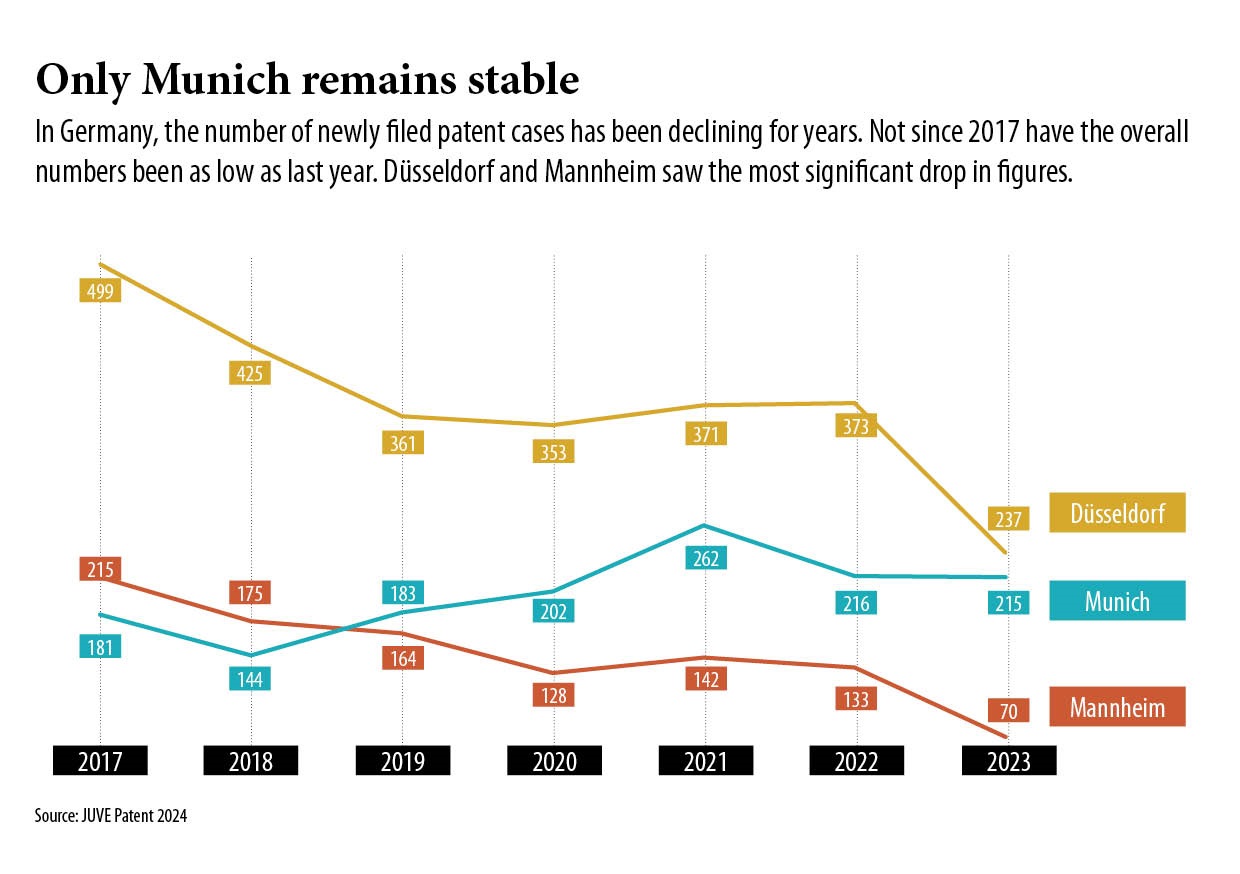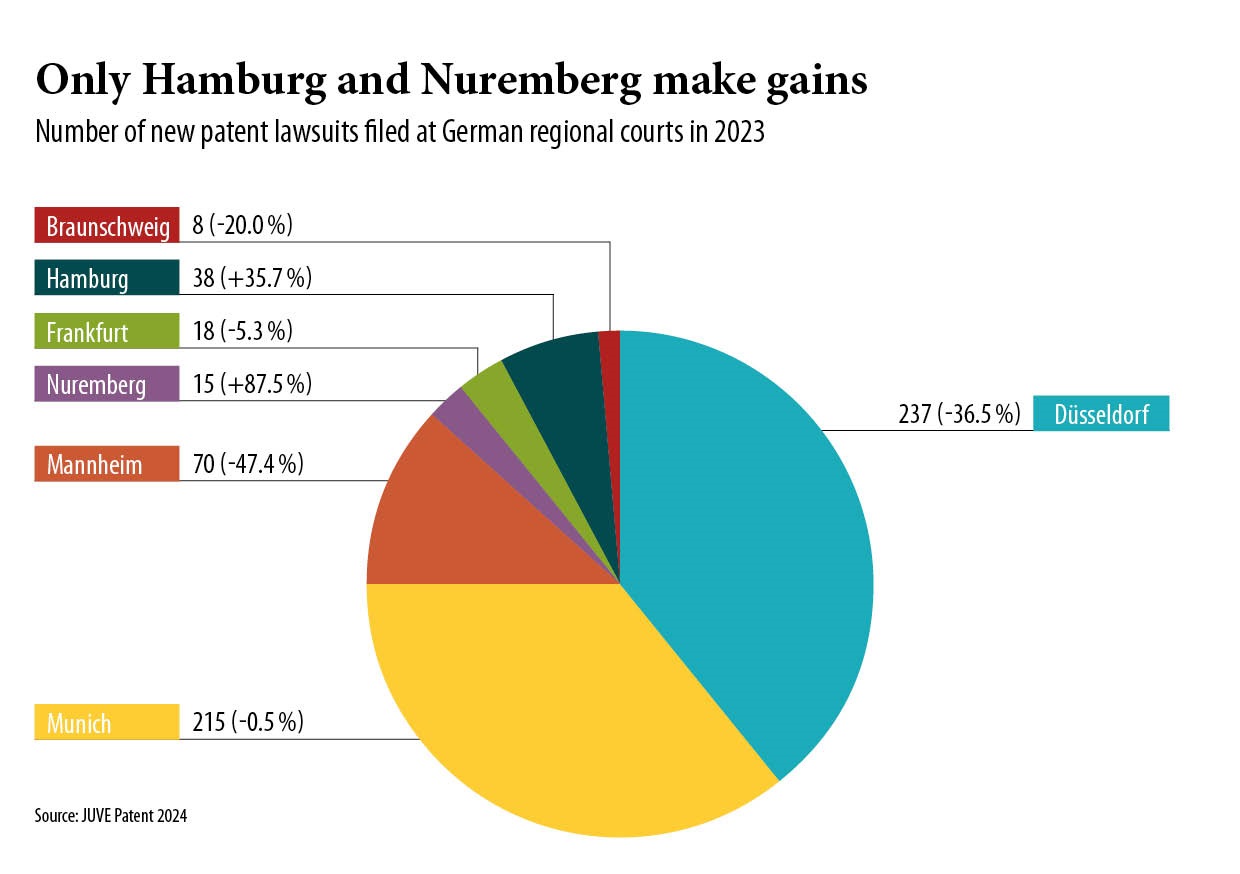Case numbers at German courts continue to fall as UPC takes off
Patent lawsuits have been declining in Germany for years and 2023 was no exception. Simultaneously, the most important courts have reduced their capacities in IP. A number of well-known German patent judges have recently moved to the UPC, which is becoming increasingly attractive for plaintiffs.
11 June 2024 by Konstanze Richter
The seven German courts specialising in patents recorded 601 new patent lawsuits in 2023 — a decline of 23.6% compared to the previous year. For the first time, the number fell well below 700 cases. This represents a decrease of one third compared to 2017 when JUVE Patent first analysed the figures.
Munich — the second most important German location for patent disputes — recorded a minimal decrease compared to the previous year. In 2023 Munich Regional Court saw 215 new patent lawsuits, only one case less than in 2022. This corresponds to a decline of 0.5%. However, the decline in the number of judgments handed down was somewhat greater at 49 compared to 55 in the previous year. At the same time, 155 proceedings were settled by other means compared to 184 in 2022.

Munich sees major cases
Munich remains an important venue for lawsuits in the mobile communications sector, as shown by recent judgments in InterDigital’s disputes with Lenovo and Oppo. Other examples include Datang’s battle with Samsung and the dispute between Huawei and AVM, which was recently settled. In 2023, Panasonic turned to the Munich Regional Court while waging its global litigation campaign against Oppo and Xiaomi. The Japanese company launched further lawsuits against the two Chinese implementers at Mannheim Regional Court, the UPC and the UK High Court in London.
The Munich court has also handed down some spectacular decisions in pharmaceuticals, such as the interpretation of the SPC waiver in the dispute between Janssen Biotech and Formycon, which was also recently settled.
By contrast, the 44th Civil Chamber hears virtually no more patent proceedings. The Munich court established the third patent chamber in 2021 to deal with the surprising increase in new cases during the second year of the COVID-19 pandemic. While it retains basic jurisdiction over patent cases, however, these are usually now assigned to the other two chambers.
Sharp drop in Düsseldorf
In Düsseldorf — the most popular venue for German patent cases — figures were more sobering. Düsseldorf Regional Court saw a sharp drop with 237 new patent cases in 2023, almost 36.5% fewer than in the previous year (373 cases). At the same time, the judges at Düsseldorf’s three civil chambers handed down 87 judgments compared to 102 in 2022, while 262 disputes were otherwise resolved, such as by settlement or withdrawal of the action. This is compared to 311 in 2022.
The Düsseldorf court recently heard a number of important proceedings concerning pharmaceutical patents. One major case was that of CureVac against BioNTech and Moderna concerning mRNA patents. Another significant case was the dispute between Mundipharma and Glenmark over damages regarding painkiller blockbuster Targin. Additionally, lawsuits concerning complex technologies continue to play a role, for example between Intel and R2 Semiconductor over CPUs.
Recently, however, Düsseldorf Regional Court lost several renowned judges to the UPC. In June the presiding judge of Civil Chamber 4a Bérénice Thom moved to the new court. Following her part-time role at the UPC, she will now work full-time at the Düsseldorf local division. Early this week the court disclosed to JUVE Patent that Thom’s successor for Civil Chamber 4a is Tilmann Büttner. He has many years of experience in patent litigation and has worked as a judge at chambers 4b and 4c, among others.
Furthermore, presiding judge of Düsseldorf’s Civil Chamber 4b Daniel Voß accepted a position as a part-time legal judge at the UPC’s local division in Munich. In 2022, when asked by JUVE Patent for their favourite judges for patent infringement cases in Germany, international patent experts voted Daniel Voß to the top of the list with 12.7%.
Mannheim sees drastic fall in lawsuits
Of the three most important German patent venues, Mannheim saw the biggest drop in cases. With only 70 new patent lawsuits in 2023 the court was 47.4% behind the previous year, which saw plaintiffs file 133 new lawsuits. No figures are available on the number of judgments.
The regional court had established the 14th Civil Chamber in 2023 as a third chamber for patent disputes. But as cases declined the court then dissolved the 7th Civil Chamber in January 2024.
Nevertheless, Mannheim remains important. Alongside Munich, the regional court will also hear Nokia’s disputes with Amazon and Vivo. In addition, Panasonic is taking action here against Xiaomi.
Not all courts see downturn
Once again, plaintiffs filed more new patent cases in Hamburg. Compared to the 28 new lawsuits in 2022, cases rose to 38 in 2023 — an increase of 35.7%. However, the number of judgments decreased by 35% to 13 compared to 20 in the previous year. In 2023 17 proceedings were settled by other means compared to five in 2022.
Nuremberg Regional Court also saw a rise in cases. The patent court counted 15 new patent lawsuits in 2023 — almost double the eight lawsuits in the previous year. Nevertheless, these are at a significantly lower level than the neighbouring Munich court. While the Nuremberg patent judges did not rule on any proceedings last year, eight ended by other means.

With 18 new lawsuits, the Frankfurt court recorded only one less case than in the previous year. The judges handed down ten judgments in patent cases, while parties settled or withdrew a further eight.
Braunschweig Regional Court remains in last place with eight new lawsuits — a decrease of 20% compared to the previous year. The court frequently hears cases arising from confiscations during major industrial trade fairs in Hanover.
UPC exacerbates decline
Even though lawsuits filed at German patent courts have been declining for years, there has not been such a sharp drop since JUVE Patent began analysing the figures in 2017. It is undoubtedly no coincidence that this development coincides with the year in which the UPC launched. Over the past year the new European patent court has seen a steady increase in lawsuits.
The suits filed at the German divisions are particularly high. According to UPC statistics, of the 373 claims filed with the new court by the end of May 2024, 260 were filed at the four German local divisions in Düsseldorf, Hamburg, Mannheim and Munich. This means that over 69.7% of UPC claims are pending at the German UPC divisions (infringement, revocation, application for PI as well as counterclaims of revocation).
The Munich local division leads with 143 of all claims, followed by Düsseldorf with 50 and Mannheim with 43. Hamburg is fourth with 24 UPC cases.
Reshuffle in Mannheim and Düsseldorf
Many major pan-European patent battles have now also reached the UPC. Panasonic, for example, is suing Oppo and Xiaomi at the new court as well as at the regional courts in Mannheim and Munich. Amgen is going head-to-head with Sanofi at the Munich local division as well as the Munich Regional Court.
The UPC recently responded to the high case load by increasing its capacities. The court not only appointed Bérénice Thom as a full-time judge in Düsseldorf and Daniel Voß as a part-time judge in Munich, but also Dirk Böttcher as a legally qualified judge at the Mannheim local division.
Dirk Böttcher is presiding judge of the 14th Civil Chamber at Mannheim Regional Court. As the chamber is responsible for patent and antitrust cases, Böttcher brings his experience in competition law to the new role.
Presiding judge of the Munich central division Ulrike Voß will also bolster the local division in Munich, as she takes over its second panel. This makes her the only UPC judge to hold two leadership roles.
Düsseldorf court loses patent senate
Following the departure of Ulrike Voß to the Unified Patent Court, the 15th Civil Senate at Düsseldorf Higher Regional Court will no longer be responsible for patent cases. In addition, the senate will undergo a reshuffle in June. The two experienced patent judges Andrea Fehre and Lena Gräwe are moving to the 2nd Civil Senate, which is also responsible for patent matters. Andrea Fehre will become deputy chair.
The 2nd Civil Senate will thus be the only remaining senate responsible for patent cases.
Experts predict that more and more companies will file their suits with the UPC in future rather than the national courts, thus likely leading to a further reduction in capacities at the latter.